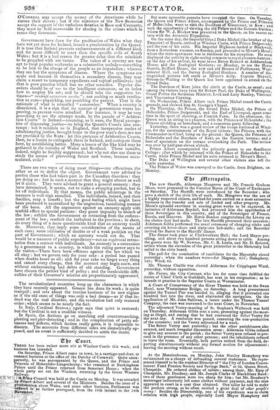Government have done for the pacification of Wales what they
have not yet done for Ireland, issued a proclamation by the Queen. It is true that Ireland presents embarrassments of a different kind, and far more difficult to meet than the specific evils of South Wales; but it is a bad reason for greater delay that the mischiefs to be grappled with are vaster. The rulers of a country are too apt to treat popular outbreaks as a substantive malady—something to be laid to the charge of the people as an imputation; whereas they are but the symptoms of disease. Where the symptoms are acute and become in themselves a secondary disease, they may claim a resort to temporary expedients and topical palliatives; but that is poor practice which has no other remedies. Popular disorders should be of use to the intelligent statesman, as an index how to employ his art; and he should take the suggestion betimes—" venienti occurrere moth,"; not seeking so much retribution as cure—physicking, not punishing the patient. That is the rationale of what is miscalled "concession." When a countr/ is disordered, it is a sign that its manner of government wants improving, to prevent worse mischief. For instance, it may be very provoking to see the attempt made, by the parade of "Arbitration Courts" in Ireland—assuming, as it were, the Royal prerogative of dispensing justice—to bring the Queen's Courts into contempt: but it reminds us in England, that inexpensive modes of administering justice, brought home to the poor man's door, are not yet provided by the State: let this pretence of Arbitration Courts, then, be a lesson to extinguish them in Ireland, and anticipate them here, by establishing better. Many a lesson of the like kind may be gathered in the tumults of Wales and Scotland. Those tumults, indeed, might be forcibly suppressed; but why not also use them to study the means of preventing future and worse, because accumulated, evils?


























 Previous page
Previous page